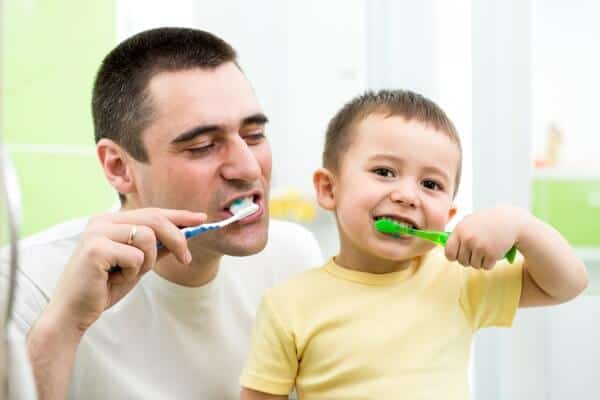Kids are the most intuitive beings. They often believe that they’re doing the right thing but many times they fail to grasp the concept of differentiating right from wrong. It’s the sole responsibility of the parents to help their kids comprehend the right behavior from wrong.
By raising a kid in a conducive environment where parents practice positive disciplining and open-communication, they can learn healthy habits that will stick with them throughout their lives.
Practice these 10 Healthy habits for kids
Here is the list of ten healthy habits that every parent should teach their kids.
1. Introduce a variety of colors of food

Eating foods of different colors isn’t just a dietary choice but a healthy food option. Many nutritionists emphasize the need to introduce the food of different colors in the kid’s regular diet.
Eating a balanced meal consisting of rich food items such as fruits, vegetables, staples, and fiber helps them grow mentally and physically. However, we all are aware of how much kids hate to eat green vegetables. You can start by helping your kids understand the nutritional value of a rainbow of colorful foods in their regular diet.
This doesn’t necessarily mean that every meal you prepare must have multicolored ingredients. But you should ensure to provide the optimum quantity of food comprising of vegetables and fruits. You can inspire them to eat healthy food by eating the same food. Kids typically want to eat the foods they see their parents enjoying. If your kid is young, you can convince them that eating colorful food is fun!
2. Don’t let them Skip breakfast

Eating breakfast comprising of a healthy meal leads to many health benefits. The first meal of the morning doesn’t only replenish the stores of energy and nutrients into your body but also develops a habit of eating regular meals in the future.
For kids who indulge in lots of cognitive and physical activity in school, eating a healthy breakfast is essential to meet the daily requirement of fiber, vitamins, and minerals.
Harvard Medical School reported that skipping breakfasts on a regular basis is 4x more likely to cause obesity in kids. High fiber contains breakfast cereals such as oats, whole grain bread, and porridge helps to reduce the risk of diabetes and heart disease.
It’s important that you reduce the intake of added sugar from your kid’s meal. Added sugar is linked to childhood obesity, chronic diseases, and behavioral issues! Average American kids get 16% of their total calories from added sugars which should be between 0-5%.
Introduce protein in their meal by adding seafood, poultry, lean beef, eggs, dairy, beans, peas, nuts, and seeds, etc.
3. Encourage Physical Activity

Physical activity is equally important for the mental and physical growth of a child. Indulging in sports helps to develop a sense of discipline in kids from an early age. However, not every child loves sports.
How do you introduce sports and gym classes to your kids? As parents, you must indulge yourself in being active. If you’re a regular gym-goer and love playing sports, your kids are more likely to pick up physical activity.
Kids are more likely to carry their love for physical activities into adulthood. A healthy lifestyle doesn’t only include eating healthy but also imbibing an active lifestyle. Kids who participate in sports at school are more likely to perform better in their academics. You can start by exposing them to a range of physical activities such as swimming, archery, soccer, dance, or acrobatics from an early age.
Don’t be a couch potato and don’t let your kid become one. You can go along with your kid for a run, play in the park, or the gym.
4. Discourage or Cut on TV Time

The Mayo Clinic reported that kids who watch more than an hour of television a day are at greater risk of health problems, including:
- poor performance at school
- behavioral difficulties such as attention deficiency
- obesity
- irregular sleep and trouble falling asleep
- less time to play
It’s hard to keep children away from the screen when they are always surrounded by one like smartphone, TV, laptop, and tablets. Although it can be helpful for them to learn online, watch education and interactive video, or simply enjoy some good movie, enjoying too much of it can be harmful to their eyes, brain, and overall lifestyle.
Parents play an important role in instilling the value of cutting on TV time by discouraging watching TV after a certain hour. Moreover, they should teach their children to use screen time in a healthy way.
5. Encourage them to read every day

Dr. Kimberly Leek, MD, American Board of Pediatrics, suggests,
“Reading with babies and toddlers helps connections form in their young brains. These connections build language, literacy, and social-emotional skills that are important in a young child’s development.”
Reading from an early age helps to develop stronger reading and socio-emotional skills in kids. It can prove to be a useful skill for a kid in school. Along with building socio-emotional skills, they can improve their confidence, literacy, language, and verbal communication.
Parents can encourage reading by reading with them. It can start with bedtime reading of stories and tales. Pediatricians recommend that parents should make reading a part of their child’s playtime and bedtime routines. You won’t believe but you can actually cultivate reading in the kids as early as 6 months of age.
6. Drink water and cut on beverages

Sugared and caffeinated drinks are harmful to people of all ages. You can keep the message simple to your kids that “Water is healthy, Soft drinks are unhealthy.”
To instill this belief, you yourself should cut on beverages such as coke, soda, sugared drinks in the restaurants. It’s harder for kids to cut on beverages when all they love is drinking sugared drinks. But how do you convince them that it’s bad? It starts with you. If you avoid drinking it, your kids are less likely to take up drinking beverages.
If your kids don’t understand all of the reasons why too much sugar is bad for them, you can help them understand the basics. Make them understand that soft drinks provide no nutrients, it could make them obese, it could affect their oral hygiene, and affect their playtime and studies.
American Heart Association (AHA) confirmed that
“Frequently drinking sugar-sweetened drinks, such as sodas and sports drinks was associated with an increased risk of death from cardiovascular diseases and, to a lesser extent, cancers.
Making kids understand this could be difficult, hence parents should take up this challenge to make them agree that water is a vital resource that humans can’t live without and they should drink it more.
7. Read Food Labels

Read food labels but clothing brands! Teach your child to do the same. The right nutrition is the key to a healthy life. Consider looking at the labels of the food you bring into your kitchen and also of their favorite packaged snacks. Avoid eating packaged food that uses preservatives such as frozen meat items, dehydrated chips, salted food, etc.
Before handing out a packet of food to your kid, consider checking the amount of sugar, saturated fat, calories, salt, monosodium glutamate (MSG). Many snacks brought from the mart contain sugar and salt over the required level. If sugar is the first ingredient listed in the packet, that snack contains more sugar than any other ingredient.
Maybe your kids won’t care if their favorite snacks have more sugar or salt in it but you should be wary of it! Eating chocolates, packaged, and sugared food is the main cause of teeth-decay, gum problems, and obesity in kids.
Experts suggest that to avoid overwhelming them, you can start focusing on a few key parts of the label such as the amount per serving of:
- Calories
- Saturated fats and trans fats
- Grams of sugar
- Salt and MSG
The overconsumption of MSG is linked to bone decay in kids. Overeating of salt can lead to frequent dehydration along with other long-term health ailments.
8. Enjoy a family time

The most important of all healthy habits is spending time with the family. With parents often out of the house for work and kids busy with school and assignments, it’s harder for a family to sit together and share the experiences. This is one of the biggest challenges of modern parenting!
According to the study by the University of Florida,
“Having dinner together as a family at least four times a week has positive effects on child development. Family dinners have been linked to a lower risk of obesity, substance abuse, eating disorders, and an increased chance of graduating from high school.”
The study has shown that sitting for a family meal together can help
- family bonds get stronger
- kids are more well-adjusted
- everyone eats more nutritious meals
- kids are less likely to be obese or overweight
- kids are less likely to abuse drugs or alcohol
Sitting for a family meal helps to communicate. it provides an opportunity for conversation where parents can share their experience with kids while kids can talk about their daily experiences such as school, academics, sports, and friends.
By engaging in a regular conversation, you can teach your kids to actively listen and talk. This will help them express their own opinions and become an active voice within the family.
9. Socialize more

Friendship is an important part of a healthy lifestyle. You can encourage your kids to socialize more by introducing them to a sporting club and quiz clubs, or any activity that they wish to pursue. It’s easy for kids to make friends over a hobby.
Spending time with friends teaches valuable social skills such as communication, cooperation, and problem-solving to kids. It can also directly affect their academic performance. Not every kid is open to making friends. You can help them by introducing different people with similar or different hobbies.
10. Encourage Positive Attitude

Kids easily get discouraged when things don’t go their way. It’s also easy to lose hope when they have lost a match or a Spelling-Bee. Kids often learn about resilience and positive attitude from their parents, teachers, and friends. Tell them that it’s ok to experience setbacks by showing them the importance of staying positive.
A positive attitude is key to maintaining mental wellbeing. As a parent and the direct counsel to your kids, you can help them develop self-esteem and a positive mindset by teaching them they are capable and unique on their own. Although it may take a while to build a stronger positive attitude in kids, do not give up.
Parents should take up authoritative parenting where they can be highly responsive to their kid’s need along with keeping high expectations to match their growing capabilities. Parents must focus on developing their kids’ behavior and habit by building behavioral blocks
